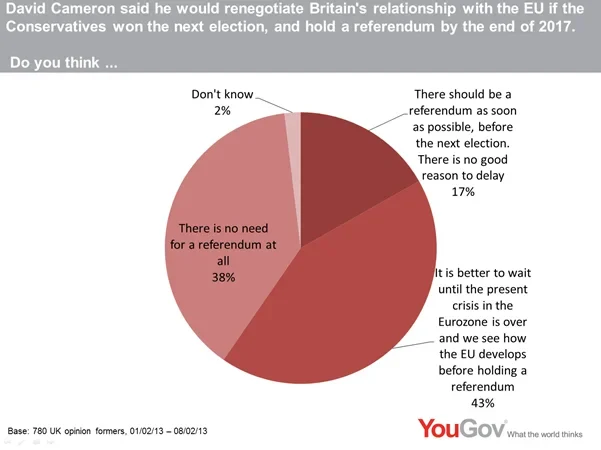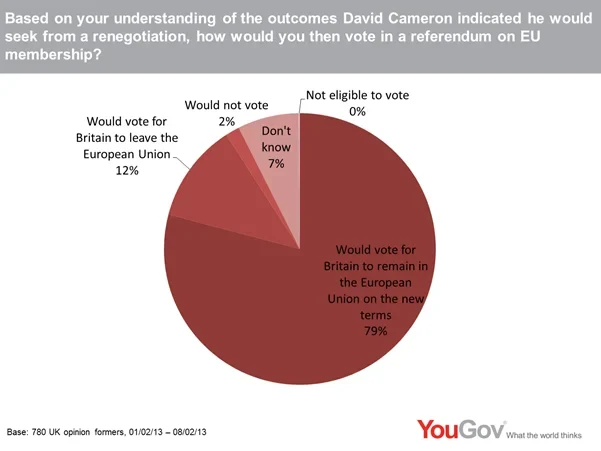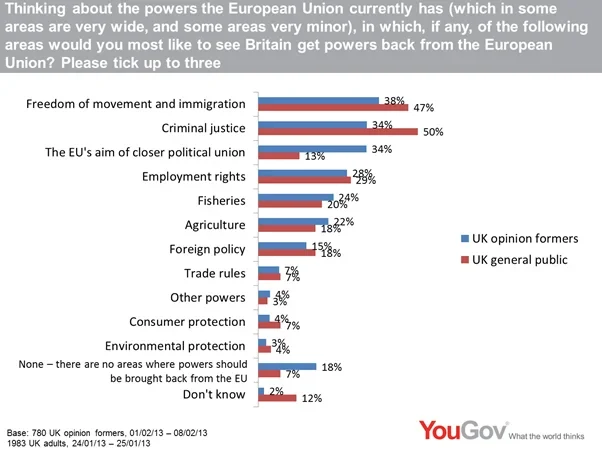Seven in ten UK opinion formers back continued EU membership and two-fifths believe there should not be a British referendum on the EU at all
Our February survey of UK opinion formers, who are influential Britons drawn from politics, business, media, academia, NGOs and the public sector, shows that a majority are in support of Britain's continued membership of the European Union. If there were a referendum tomorrow on Britain's membership of the EU, 70% say they would vote to remain a member while just over a fifth (22%) say they would vote to leave.
Respondents who would vote Conservative at the next general election however are less likely to vote for continued EU membership (57% for, 31% against) compared to their counterparts that would vote Labour (94% for, 5% against) and Liberal Democrat (89% for, 7% against). Those working in business were also less likely to vote in favour of continued EU membership (63% for, 29% against).
David Cameron's renegotiation proposal
In his key speech on Europe earlier this year, David Cameron announced that, if re-elected in 2015, he would renegotiate Britain's relationship with the European Union and then hold an in-out referendum on whether Britain should accept the new terms or leave the EU. UK opinion formers are divided on this, with 47% in support of the Prime Minister’s policy, but 47% opposing it (6% don’t know). Unsurprisingly, there are strong variations by party lines, with 82% of Conservative voters in support of Cameron’s proposal, but only 16% of Labour and 21% of Liberal Democrat voters.

Asked specifically when a referendum should be held, a similar proportion (43%) of opinion formers agree with Cameron’s proposal to wait until after the current crisis in the eurozone is over and it is clear how the EU will develop before holding a referendum. Only 17% urge for a referendum to be held as soon as possible. However, 38% are against holding a referendum at all.
This contrasts with the British public, which is more divided on when a referendum should be held. 35% are for holding a referendum as soon as possible, but 35% agree with Cameron that it is better to wait until after the current eurozone crisis. Only 18% do not think a referendum should be held, a much lower proportion than for the opinion formers (38%).
If David Cameron were to be successful in his renegotiation of Britain’s relationship with the European Union, and a referendum were then to be held, UK opinion formers would be even more likely to vote for Britain remaining in the EU. 79% would vote to remain in the EU on new terms, with only 12% then voting to leave the EU.

Examining UK opinion formers by party, it is clear that Cameron’s proposal to hold a referendum after renegotiating the UK’s relationship with the EU would make Conservative voters more likely to vote in favour of remaining in the EU. The proportion rises to 81% who would vote yes in such a scenario, compared to only 57% saying they would vote to remain if there were a referendum tomorrow.
Regaining powers from the EU
A key part of any renegotiation of the UK’s relationship with the EU would almost certainly involve Britain attempting to regain powers it had transferred to Brussels. Opinion formers were asked which powers they would most like to see returned to Britain from the EU. Top on the list is powers over freedom of movement and immigration, which 38% would like to see repatriated. In joint second place are criminal justice and the EU’s aim of closer political union, at 34%. This is similar to the general public, who also identified criminal justice’ and Freedom of movement and immigration as the top powers that they would like to see returned.
Lowest on the list for the opinion formers are environmental protection (3%) and consumer protection (4%). However, nearly a fifth (18%) of opinion formers do not believe that there are any areas where powers should be brought back from the EU.
Opinion formers who would vote Conservative at the next General Election are more likely to say that they would like to see powers returned to Britain – only 3% don’t think that there are areas where powers should be returned, compared to 35% of Labour respondents and 37% of Lib Dem respondents. Over half of Conservative respondents (55%) would like to see powers over freedom of movement and immigration returned to the UK, 50% think so about criminal justice. The top power to repatriate, according to Labour and Lib Dem voters, is the EU’s aim of closer political union, for just under a third of each.










